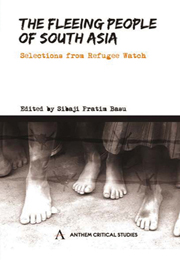Book contents
- Frontmatter
- Contents
- Acronyms and Abbreviations
- Foreword by Ranabir Samaddar
- Preface
- ETHICAL ISSUES
- LAWS
- SOUTH ASIA
- Introduction
- Refugees in South Asia: An Overview
- Internally Displaced Persons in Sri Lanka
- A Matter of Ethnicity
- Scrutinizing the Land Resettlement Scheme in Bhutan
- The Taliban Shelter Seekers or Refugee Warriors?
- Afghan Refugees head for Tajikistan, holed up in the Pamir Mountains
- Impact of International Jurisdiction on Afghan Refugee Rights
- Development Induced Displacement in Pakistan
- On the Trail of Burma's Internal Refugees
- Assault on Minorities in Bangladesh: An Analysis
- Neoliberal Globalization and Women's Experiences of Forced Migrations in Asia
- Who Went Where and How are They Doing? Pakistanis and Indians Outside South Asia
- INDIA
- GENDER
- INTERVIEW/CORRESPONDENCE
- REPRESENTATIONS
- Index
Neoliberal Globalization and Women's Experiences of Forced Migrations in Asia
from SOUTH ASIA
Published online by Cambridge University Press: 05 March 2012
- Frontmatter
- Contents
- Acronyms and Abbreviations
- Foreword by Ranabir Samaddar
- Preface
- ETHICAL ISSUES
- LAWS
- SOUTH ASIA
- Introduction
- Refugees in South Asia: An Overview
- Internally Displaced Persons in Sri Lanka
- A Matter of Ethnicity
- Scrutinizing the Land Resettlement Scheme in Bhutan
- The Taliban Shelter Seekers or Refugee Warriors?
- Afghan Refugees head for Tajikistan, holed up in the Pamir Mountains
- Impact of International Jurisdiction on Afghan Refugee Rights
- Development Induced Displacement in Pakistan
- On the Trail of Burma's Internal Refugees
- Assault on Minorities in Bangladesh: An Analysis
- Neoliberal Globalization and Women's Experiences of Forced Migrations in Asia
- Who Went Where and How are They Doing? Pakistanis and Indians Outside South Asia
- INDIA
- GENDER
- INTERVIEW/CORRESPONDENCE
- REPRESENTATIONS
- Index
Summary
INTRODUCTION
The world is now characterized by extensive and rapid movements of people. An increasingly important issue for industrialized countries, such as Australia, is the rising number of people who are becoming displaced within their homelands as a result of a multitude of interconnected factors. The majority of displaced persons and refugees in our region are women and children. Yet, they are severely underrepresented in refugee determination processes, claims for asylum and settlement. This paper will examine women's experiences of forced migration and the neoliberal global context in which they occur. Over the past two decades the implementation of neoliberal policies in both the north and south have not only resulted in colossal displacements, but have simultaneously given rise to exclusionary politics. While globalization conjures up a vision of a borderless world, as a result of free flow of goods, this paper will show that increasingly nation states have closed their borders to the displaced, emphasizing the distinction between ‘economic’ migrants and political refugees.
[…] The persistent dichotomy of internal and external displacement, and the failure to classify as refugees those who have not crossed an international border, despite the escalation of their numbers in developing countries in the Asian region exemplifies the Eurocentric nature of refugee discourse. The complex processes of decolonization and increased integration of the world economy have set in motion large-scale population movements that render meaningless distinct categories of dislocations.
- Type
- Chapter
- Information
- The Fleeing People of South AsiaSelections from Refugee Watch, pp. 196 - 206Publisher: Anthem PressPrint publication year: 2009



